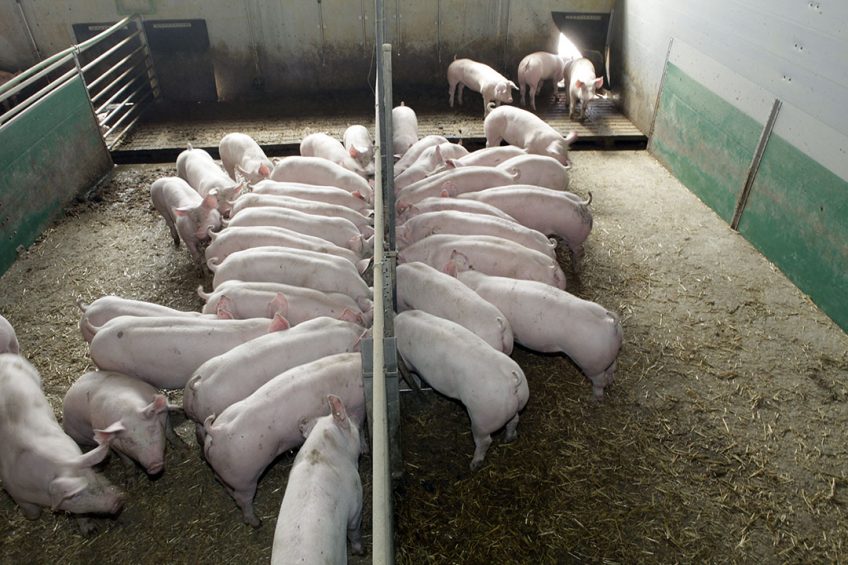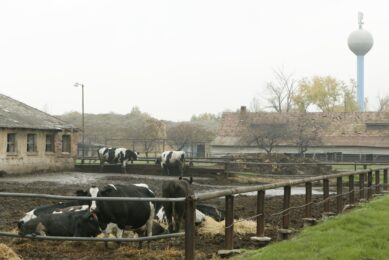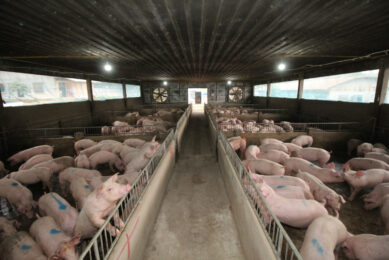Covid-19: Pig feed industry learns from ASF experiences

Experiences with African Swine Fever can come in very handy for the pig feed industry worldwide these days. Knowledge can be used for challenges that Covid-19 may present in 2020.
As the world continues to grapple with Covid-19, pig feed producers also continue to navigate challenges stemming from another virus that only affects pigs: African Swine Fever (ASF). They are ready to apply the lessons they have learned so far.
Large shifts in global pig feed market
The severe decline in pork production in China due to ASF has resulted in large shifts in the global pig feed market. Feed makers have diversified their offerings to some extent and are looking for new opportunities, but for those which still produce pig feed (most of them), the fact that ASFv and other pathogenic viruses can survive in feed ingredients has added another layer of challenge.

Track the movement of African Swine Fever
For everything you need to know about ASF, from the latest outbreaks to controls stay up to-date…
High stability of ASFv
The Iowa, USA-based Swine Health Information Center, which aims to protect and enhance the health of the US swine herd through coordinated global disease monitoring and more, notes that the high stability of ASFv across a diverse range of feed ingredients has already been established by multiple research groups. Early 2019, scientists at Kansas State University showed that ASFv can ‘easily’ be transmitted orally to pigs, though higher doses are required for infection through plant-based feed.
Long list of high-risk ingredients
The Canadian Pork Council lists synthetic amino acids packaged in single-use bags as a pig feed ingredient with lower risk for ASFv content. The list of high-risk ingredients, on the other hand, is quite long. It includes rice hulls, corn cobs, conventional soybean meal, organic soybean meal, soy oil cake, distillers dried grains with solubles (DDGS), lysine hydrochloride, Choline Chloride and vitamin D.
Canada: Import controls on plant-based feed
In April 2019, to help keep Canada ASF-free, the Canadian Food Inspection Agency began applying additional import controls on plant-based feed ingredients from countries of concern.
US: Import restrictions on organic soy for feed
To ensure the US swine herd remains free of ASF, in late February, the National Pork Producers Council (NPPC) and 30 state pork producer associations asked the US agriculture secretary to take additional measures, including restricting imports of organic soy products for animal feeds from all ASF-positive countries. (NPPC is confident about the safety of domestic soy products.)
The US pork and feed industries have already adopted holding times to allow for the natural degradation of any viruses that might be present in imported feed ingredients. However, NPPC points to research showing organic soy products can maintain the virus for longer periods of time, making holding times impractical. NPPC and the associations have also asked the US Department of Agriculture to further explore the merit of restricting all soy products from ASF-positive countries.
Australia: Imports must meet certain conditions
In Australia, imports have continued from countries experiencing the disease as long as the products meet conditions of entry set by the Australian government. These standards include an in-country inspection of the supply chain and facilities, ensuring there are no animal by-products included and ensuring any plant-based products are heat- and moisture-treated as part of the manufacturing process. Products may also be quarantined for a period of time (not mandatory).
Duncan Rowland, executive officer at the Stock Feed Manufacturers’ Council of Australia noted that in 2019, feed ingredient import permits were delayed by 1-6 months due to the changing risk profile presented by ASF. However, industry and government have worked together on this issue and the permit process has been successfully streamlined.

Covid-19 Up-date
What impact is the pandemic having on the global pig sector and how are they dealing with it.
Feed ingredient availability and pricing
USA: No signs of lack of feed ingredients
NPPC communications officer Rachel Gantz said she and her colleagues have not yet heard about any lack of availability of feed ingredients due to ASF, and NPPC has no specific data on any related cost changes. However, Tom Seite, president of US-based Ridley Feed Ingredients (owned by Alltech), reported that at the start of 2020, prices for vitamins and amino acids were under pressure due to the reduction in swine feed tonnes in China as a result of ASF. “Then the impact of the Coronavirus swung these markets the other direction due to extended shutdowns of Chinese production plants making amino acids, vitamins and other speciality ingredients,” he explained. “As a result, domestic supplies are tight and rising in price.”
Australia: Potential small increase in costs of ingredients
Rowland noted that in Australia this year, “there may be a small increase in the cost of other ingredients due to the quarantining of product, but this is something that is based on individual business arrangements between the manufacturer and the end-user.”
Otherwise, Rowland predicts that any changes to prices and supply of product will be Covid-based and not ASF-based unless ASF rapidly develops in countries that presently don’t have it and supply large quantities of feed ingredients to the Australian market. “I’m not sure there are any left though,” he says.
Europe: No sourcing pattern changes
In Europe, the European Feed Manufacturers’ Federation (FEFAC) notes that ASF has caused no appreciable sourcing pattern changes among its members. Certain feed companies store certain feed ingredients of pig origin for some time as additional risk management measure, said FEFAC senior policy and communication manager Anton van den Brink.
“The prerequisite to prevent dissemination of virus is strict implementation of biosecurity measures at all stages of the chain,” he said.” It is acknowledged that the highest risk of dissemination of the virus is via direct contact between wild and farmed animals, or between humans and animals or via infected vehicles. That is why FEFAC set up a dedicated Biosecurity Task Force to disseminate best biosecurity recommendations along the feed chain from suppliers of feed ingredients, down to not just commercial pig farms, but also poultry farms (avian flu).”
And whilst the possible effects of Covid-19 on supply chains will not be related to pig biosecurity, “we simply don’t know what we don’t know,” said Rowland, “in relation to its potential impact.” However, the tightening of supply chain relationships and various new strategies that the global feed industry has put in place as a result of ASF spread can only help.
Already, at Ridley Feed Ingredients, they are anticipating their needs for amino acids, vitamins and other speciality ingredients in light of what may come in 2020. The firm is striving “to be in a position to handle surges in orders so that we can properly service customers,” said Seite. “It has not been an easy task, and it ties up additional inventory dollars, but we have been able to make it work.”












